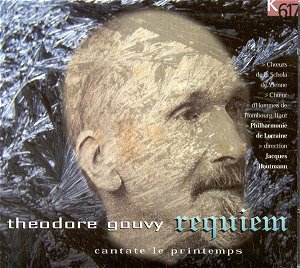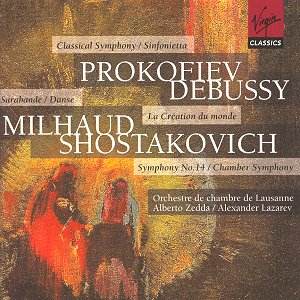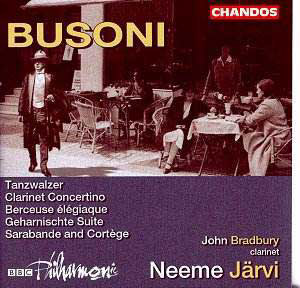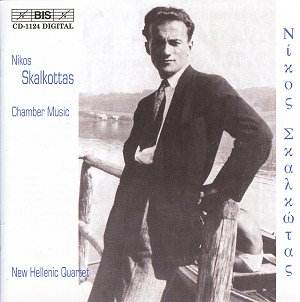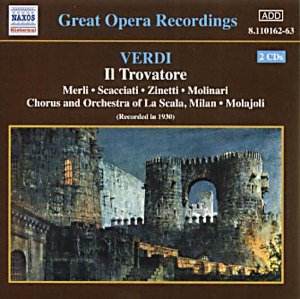 Composer: Giuseppe Verdi
Composer: Giuseppe Verdi
Works: Il Trovatore
Performers: Bianca Scacciati (soprano), Enrico Molinari (baritone), Giuseppe Zinetti (mezzo-soprano), Francesco Merli (tenor), Corrado Zambelli (bass), Emilio Venturini (tenor), Ida Mannarini (soprano), Enzo Arnaldi (bass), Chorus and Orchestra of La Scala, Milan
Recording: Recorded on 28 sides by Italian Columbia, 10-23 September 1930
Label: NAXOS
Verdi’s Il Trovatore, with its tumultuous, convoluted narrative, remains a testament to the operatic passions of the mid-19th century. Premiered in 1853, this work exemplifies the composer’s mastery in fusing dramatic narrative with powerful musical expression. The recording under review, conducted by Lorenzo Molajoli and featuring a cast that includes the illustrious Bianca Scacciati and Enrico Molinari, transports listeners back to an era when opera was as much about vocal prowess as it was about theatricality.
Scacciati’s portrayal of Leonora is particularly noteworthy, embodying the character’s emotional depth with a voice that traverses the extremes of the role. Her agility shines in the cabaletta Di tale amor, where her ability to negotiate the florid passages is matched by her dramatic fervor. Yet, one cannot overlook the occasional lack of portamento that disrupts the seamlessness of her melodic lines. This stylistic choice, while perhaps reflective of the period’s performance practices, does create moments where the line of music feels momentarily disjointed. Nonetheless, her performance is imbued with a sincerity that resonates deeply, particularly in the fourth act’s scena beginning with D’amor sull’ali rosee, where her cadenzas reveal both technical prowess and emotional resonance.
Molinari’s Il Conte di Luna is a study in the interplay of vocal color and dramatic intent. His rich baritone traverses the emotional landscape of the character with a palpable intensity, notably in Il balen and Io fremo, where his delivery evokes the character’s jealousy and despair. The trio featuring Scacciati and Merli showcases Molinari’s ability to harmonize with the ensemble while maintaining the individuality of his character’s voice. The ensemble singing throughout is commendable, characterized by a remarkable unanimity that seamlessly integrates the orchestra and vocalists, despite the somewhat muted timbre of the strings.
Merli, too, is a standout, particularly in the iconic aria Di quella pira. His thrilling top C, held for an impressive duration, electrifies the listener, embodying the heroic essence of Manrico. This bravura moment, while historically significant given the tenor’s liberties with Verdi’s original notation, brings to the performance a visceral excitement that is hard to resist. The contrast between his power and Zinetti’s interpretative choices as Azucena further enriches the listening experience, though Zinetti occasionally sacrifices diction for vocal color, particularly in Stride la vampa.
The engineering quality of this recording, a transfer from original 78s, offers a distinctly vintage sound while allowing the vibrancy of the performance to shine through. The chorus, particularly during the Anvil Chorus, exhibits a robust ensemble sound that captures the energy of the original performance setting. However, there are moments, particularly in the Miserere, where the intonation of the unaccompanied chorus falters slightly, revealing the challenges of live recordings from this era.
Listeners familiar with contemporary renditions may find themselves reflecting on the differences in interpretative choices, particularly the historical context of these performances. There is a palpable authenticity to the singing style that contrasts with modern practices, which often emphasize a different vocal aesthetic. This recording serves as a valuable artifact, illustrating the artistry and challenges of a bygone era while celebrating the timelessness of Verdi’s music.
The Naxos Historical series offers a gateway into the past, and this recording of Il Trovatore stands as a glorious testament to the artistry of its performers. With its blend of impassioned singing, historical significance, and the vibrancy of the orchestral accompaniment, this release is an essential addition for both connoisseurs of Verdi and those exploring the rich tapestry of early 20th-century opera.
